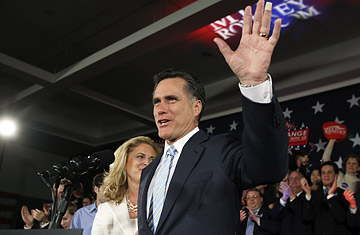
Mitt Romney and his wife Ann take the stage at his Super Tuesday primary-watch party in Boston, Massachusetts.
At nearly every diner and ballroom Mitt Romney stormed in a 60-hour campaign sprint before Super Tuesday, he declared that the fight for the Republican nomination was now a two-person contest. After the results from all 22 states are in, it appears declaring it does not make it so.
Romney's final campaigning failed to produce a first- or second-place finish in the bulk of the states he visited. In Tennessee, Missouri, Georgia and Oklahoma, Romney trailed Mike Huckabee, the man he tried to write out of the race. Romney also lost California, which he visited Monday, to McCain, and West Virginia, which he visited Tuesday morning, to Huckabee.
At his victory rally in Little Rock, Ark., Huckabee took a hard-earned moment to gloat, having overwhelmingly won four southern states despite having been counted out by the national press. "Today people across this country are saying that, yes, we heard what the pundits said," Huckabee told the crowd, speaking, as usual, without notes. "But this is our vote, not theirs. This is our election, not theirs. This is our presidency, not theirs."
Back in Boston, Romney was reduced to pledging to continue to fight "all the way to the convention." He quoted his wife in describing the muddled message that had been sent by the American people. "Ann came to me and she said, 'You know, the one thing that's clear tonight is that nothing's clear,'" he said.
But the results showed the clearest picture yet of the Republican nomination fight. McCain has both cemented his position as the Republican front-runner, and failed to win the support of much of his party's conservative base. Romney has also failed, thus far, to establish himself as the clear standard-bearer for that conservative movement, especially in the South, where Huckabee holds an obvious claim to the evangelical vote.
To date, Romney's success has mostly come at the margins, in small-state caucuses like Maine, Nevada and North Dakota, where other campaigns have not competed. The three larger primaries he has won — Michigan, Massachusetts and Utah — were in his native home, his current home and his spiritual home.
After his vow to fight on, Romney's chief spokesman did his best to put a positive spin on the night, pointing to Huckabee's significant weaknesses as a serious rival to McCain. "We can make an electability argument that Mike Huckabee can't," said Kevin Madden. "He is limited in his regional appeal." Indeed, Huckabee has yet to garner a significant block of votes outside his mostly evangelical base, which is heavily concentrated in the South.
But Madden was also describing a Romney appeal that has so far failed to materialize. The campaign has gone through repeated rebirths, with new themes and new campaign signs, new ads and new message strategies. Romney has tried to be the candidate of true fiscal, social and national security conservatism. He has tried to be the corporate executive candidate who understands the economy. He has tried to be the candidate of change, who will shake up Washington. On Tuesday night, his rhetoric took on a previously unseen, almost Trotskyite tenor: "It's time for the politicians to leave Washington and for we, the people, to take over!"
Each Romney iteration has been backed by significant spending, but none has achieved mass appeal in a Republican Party that has long been dissatisfied with its candidate options. On Thursday, Romney is scheduled to try again, with a speech before the Conservative Political Action conference in Washington, the premier annual meeting of activists who largely distrust McCain. (McCain is also scheduled to speak.)
One of Romney's greatest campaign assets is his relentless optimism. His vow to fight on to the convention was less delusional than constitutional; he genuinely believes the tide is always about to turn in his favor. But Romney is also a former management consultant, a numbers-cruncher unlikely to remain a candidate if he concludes that winning is no longer a serious possibility. At the very least, Super Tuesday reminded him of the difference between three and two.
